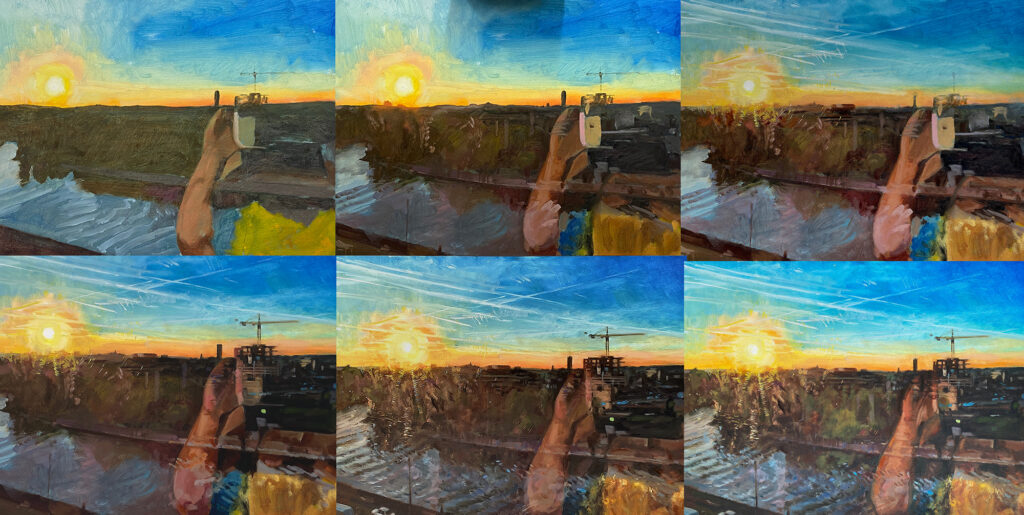
Personally, being an artist who, for whatever reason, feels compelled to find more and more detail in a subject at the risk of overworking, I keep two phrases in my mind:
- Stop when the work is 90% finished. The frame will add the last 10%
- Stop when the painting gives back the feeling that compelled me to paint the subject in the first place.
I asked Chat GPT for more, and it found me the following fourteen artist quotes. It suggests that they can be categorised into four common themes:
- Emotional Resonance: Many artists stop when the piece feels right.
- Conceptual Fulfilment: Some complete the work when its core idea is expressed.
- Visual Harmony: Others look for formal balance or tension.
- Practical Necessity: Sometimes, it’s simply time to move on.
- Leonardo da Vinci
“Art is never finished, only abandoned.” Source: Giorgio Vasari, Lives of the Artists (1568)
Leonardo’s insight speaks to the infinite refinement possible in art. His notebooks and unfinished works (like the Adoration of the Magi) remind us how often he walked away rather than call something ‘done’. - Pablo Picasso
“To finish a work? What nonsense! To finish it means to be through with it, to kill it, to rid it of its soul…” Source: Brassaï, Conversations with Picasso (1999)
For Picasso, the life of a painting is in its making. Finality, in his view, can drain the spontaneity and energy that gives art its soul. - Paul Cézanne
“A work of art which did not begin in emotion is not art.” Source: Émile Bernard, Conversations avec Cézanne (1904)
While not directly about finishing, Cézanne’s approach focused on emotional and visual integrity over polished completion. Many of his works appear intentionally ‘unfinished’, highlighting process over product. - Jackson Pollock
“How do you know when you’re finished with a painting? How do you know when you’re finished making love?” Source: The Legacy of Jackson Pollock, Art News (1958)
Pollock’s response underscores the intuitive and physical nature of painting. For him, completion was felt, not calculated. - Lucian Freud
“A painting is only finished when the artist says it is.” Source: Interview with William Feaver, Lucian Freud: Painting People (2007)
Freud was known for reworking his canvases obsessively. Completion, for him, was a matter of personal judgment—no one else could decide that. - Georges Braque
“A painting is never finished — it simply stops in interesting places.” Source: John Richardson, A Life of Picasso, Vol. 2 (1996), citing Braque
Braque’s poetic take suggests that a work can reach a point where it invites the viewer to continue the experience mentally. - Frank Auerbach
“It’s done when it looks as if it were done all at once.” Source: Catherine Lampert, Frank Auerbach: Speaking and Painting (2015)
Auerbach often painted and scraped back his canvases for years. His benchmark for finishing? Unity and energy that feels spontaneous—even if it took 200 sessions to get there. - David Hockney
“You can finish a painting by declaring it finished. Sometimes you just want to get on with the next one.” Source: Martin Gayford, A Bigger Message: Conversations with David Hockney (2011)
For Hockney, finality can be pragmatic. He embraces imperfection and understands that every painting is part of a continuum. - Ken Howard
“A painting is successful when it conveys the initial inspiration or feeling that prompted its creation.” Source: Paraphrased from interviews and commentary, including Create Arts
Howard believed that a painting is finished when it gives back to the artist the feeling that sparked the work in the first place. Emotional fidelity to the original subject was his benchmark for success. - Richard Schmid
“You are finished when you have said what you wish to say, when nothing added can make it better.” Source: Alla Prima II: Everything I Know About Painting (2013)
Schmid encourages clarity of intent. A painting is finished not when it’s perfect, but when its message is complete. - Eugene Delacroix
“Perhaps the sketch of a work is so pleasing because everyone can finish it as he chooses.” Source: Journal of Eugène Delacroix
Delacroix saw potential in the incomplete. A sketch invites interpretation; a finished work can feel closed. - William Baziotes
“Each painting has its own way of evolving. When the painting is finished, the subject reveals itself.” Source: Jackson’s Art Blog
For Baziotes, finishing is a moment of revelation—when the painting speaks back and reveals what it truly is. - Claude Monet
“While adding the finishing touches to a painting might appear insignificant, it is much harder to do than one might suppose.” Source: David Langevin, Artist Blog
Even the most ‘finished’ works may hinge on subtle decisions. For Monet, the final stage was delicate and deeply complex. - Kent Nerburn
“We are seeking that moment when our work turns toward us and says ‘I am complete. I am done.’” Source: Tara Leaver’s blog
Nerburn’s poetic take reminds us that the work itself may tell us when it’s done—if we’re listening.